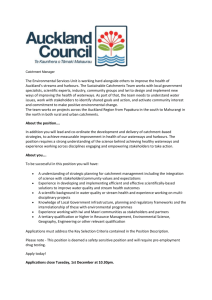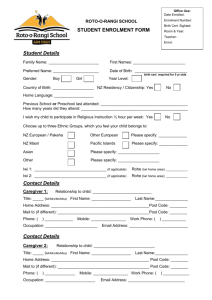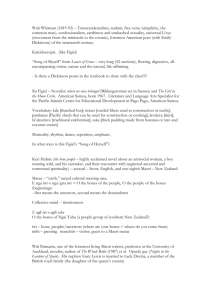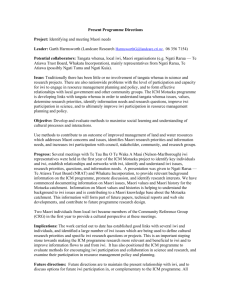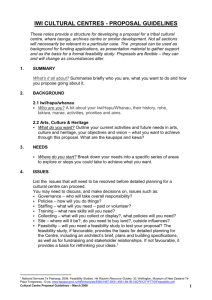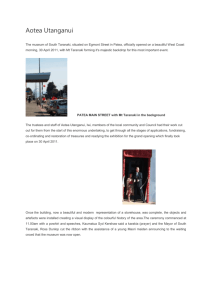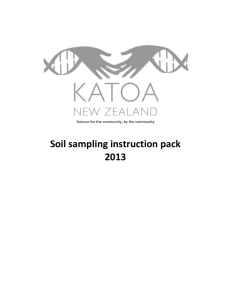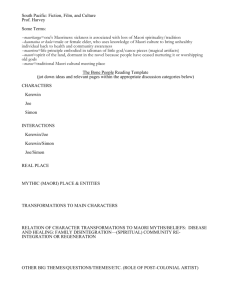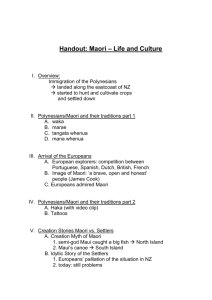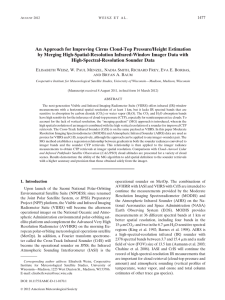Identifying and meeting Maori needs
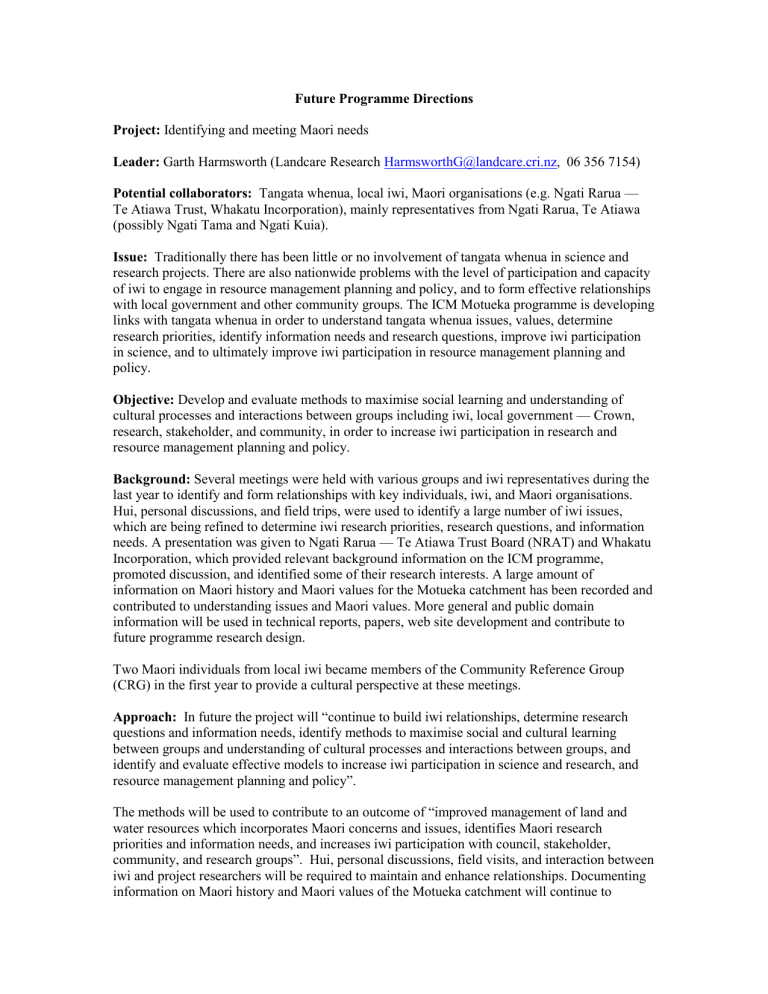
Future Programme Directions
Project: Identifying and meeting Maori needs
Leader: Garth Harmsworth (Landcare Research HarmsworthG@landcare.cri.nz
, 06 356 7154)
Potential collaborators: Tangata whenua, local iwi, Maori organisations (e.g. Ngati Rarua —
Te Atiawa Trust, Whakatu Incorporation), mainly representatives from Ngati Rarua, Te Atiawa
(possibly Ngati Tama and Ngati Kuia).
Issue: Traditionally there has been little or no involvement of tangata whenua in science and research projects. There are also nationwide problems with the level of participation and capacity of iwi to engage in resource management planning and policy, and to form effective relationships with local government and other community groups. The ICM Motueka programme is developing links with tangata whenua in order to understand tangata whenua issues, values, determine research priorities, identify information needs and research questions, improve iwi participation in science, and to ultimately improve iwi participation in resource management planning and policy.
Objective: Develop and evaluate methods to maximise social learning and understanding of cultural processes and interactions between groups including iwi, local government — Crown, research, stakeholder, and community, in order to increase iwi participation in research and resource management planning and policy.
Background: Several meetings were held with various groups and iwi representatives during the last year to identify and form relationships with key individuals, iwi, and Maori organisations.
Hui, personal discussions, and field trips, were used to identify a large number of iwi issues, which are being refined to determine iwi research priorities, research questions, and information needs. A presentation was given to Ngati Rarua — Te Atiawa Trust Board (NRAT) and Whakatu
Incorporation, which provided relevant background information on the ICM programme, promoted discussion, and identified some of their research interests. A large amount of information on Maori history and Maori values for the Motueka catchment has been recorded and contributed to understanding issues and Maori values. More general and public domain information will be used in technical reports, papers, web site development and contribute to future programme research design.
Two Maori individuals from local iwi became members of the Community Reference Group
(CRG) in the first year to provide a cultural perspective at these meetings.
Approach: In future the project will “continue to build iwi relationships, determine research questions and information needs, identify methods to maximise social and cultural learning between groups and understanding of cultural processes and interactions between groups, and identify and evaluate effective models to increase iwi participation in science and research, and resource management planning and policy”.
The methods will be used to contribute to an outcome of “improved management of land and water resources which incorporates Maori concerns and issues, identifies Maori research priorities and information needs, and increases iwi participation with council, stakeholder, community, and research groups”. Hui, personal discussions, field visits, and interaction between iwi and project researchers will be required to maintain and enhance relationships. Documenting information on Maori history and Maori values of the Motueka catchment will continue to
provide a basis for understanding spatial and temporal environmental and cultural change, iwi issues, and provide Maori knowledge which can contribute to future integrated and complementary knowledge systems. The following tasks are anticipated:
Refine and use iwi issues (from first year) to determine iwi research priorities, and identify research questions and information needs. Identify research questions that are either more generic or nationally focussed (e.g. effective Iwi—Crown partnerships for resource mangement planning and policy) or specific catchment oriented research questions (e.g. land use effects on cultural values). Identify potential iwi projects.
Use information on issues and cultural research priorities to help shape ICM programme objectives to maximise research relevance to iwi and benefits back to iwi groups and Maori organisations, define information needs, and improve two way information flows between iwi,
ICM programme researchers and other groups.
Document information on Maori history and Maori values of the Motueka catchment to provide a basis for understanding spatial and temporal environmental and cultural change, iwi issues, and provide Maori knowledge which can contribute to future integrated and complementary knowledge systems.
Identify and evaluate effective relationship and partnership processes and models which can be used to maximise social learning between groups, understanding of cultural values and proceses, and to improve participation by iwi in research and resource management policy and planning.
We will examine the way iwi are presently involved in resource management planning and policy to date and identify processes and models which improve iwi interaction and learning with existing groups (e.g. local government — Crown, research, stakeholder, community) and increase participation in the ICM programme and in resource management planning and policy in general.
Outputs and Outcomes: The outcome for this work should be “increased and effective participation by iwi in research and in resource management planning and policy, to improve cultural input, focus, and interactions in sustainable catchment management”. Outputs will include on-going hui, field-trips, individual discussions, relationship building, contributions to technical reports, papers, web sites, and development of approporiate integrated and complementary knowledge systems.
